I was reluctant to join Twitter at first, but now I really love it. It turns out that the reasons people think they’re going to hate Twitter don’t reflect the real experience of actual users. That being said, with #elxn41 (that’s Twitter-speak for “this specific federal election we happen to suddenly find ourselves in”) underway, all sorts of politicians are rushing to use the service, usually for the first time. In turn, the mainstream media (or “MSM” as we say in tweets to save characters) is breathlessly analyzing the importance of political microblogging, and claiming that all politicians are “expected” to play the game.
Maybe I’m just in a contrarian mood. Maybe I’m wrong. Maybe I haven’t blogged in awhile and I figure some link-bait like a top-10 list is what I need to regain some momentum and clout. (Yes, Twitter friends, apparently that’s how that word is supposed to be spelled. I’m surprised too.) Whatever the reason, if you’re a political candidate considering taking the fail whale for a ride, here are some reasons you might want to think twice.
1. You’ve never tweeted before now.
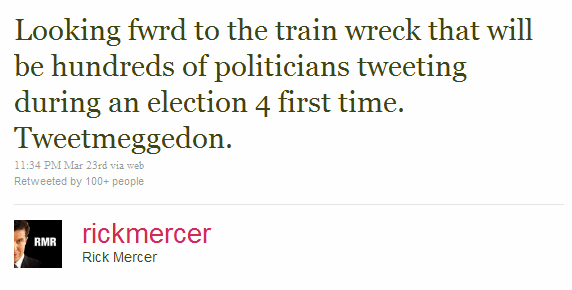 You’re heading into a very short election, and while Twitter isn’t hugely complicated or difficult to use, it does involve a bit of a learning curve. Better you focus on the tools you already know how to use well then start trying to learn a new one at this late hour. Also, a big part of using Twitter successfully involves building up a following overtime, and unless you’re already a very high-profile person it’s probably too late for you to start that now.
You’re heading into a very short election, and while Twitter isn’t hugely complicated or difficult to use, it does involve a bit of a learning curve. Better you focus on the tools you already know how to use well then start trying to learn a new one at this late hour. Also, a big part of using Twitter successfully involves building up a following overtime, and unless you’re already a very high-profile person it’s probably too late for you to start that now.
2. You’re not going to do it yourself.
So, given point number one, you might choose to hire a social media expert (or, more likely, take advantage of the most pimple-faced volunteer in your campaign office) to run Twitter for you. But this isn’t like outsourcing your flyer text (which presumably you direct and approve) or hiring a speech writer (to create a product you will ultimately deliver with your own voice). Twitter is real-time and interactive. Done well, it should be spontaneous and (with apologies to Andrew Potter) authentic, and unless you’ve staffed your tweets out to someone who knows you so well they can speak for you and finish your sentences, it’s not going to work. Even then, if someone else is doing your tweeting for you that probably means you’re not actually reading anyone else’s tweets, which brings us to…
3. You’re not interested in real conversations.
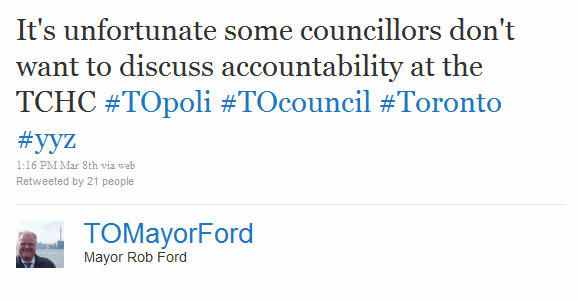 Twitter is not a broadcast medium. It’s not just another channel for you to get your message out there. One of the amazing things about Twitter is that previously inaccessible people from famous movie stars to local columnists will actually respond to strangers and even enter into conversations. If you’re not going to do that, and do it quickly (people often expect Twitter replies within a few hours, if not immediately) the only message you’ll be sending is that you’re not going to be a responsive representative.
Twitter is not a broadcast medium. It’s not just another channel for you to get your message out there. One of the amazing things about Twitter is that previously inaccessible people from famous movie stars to local columnists will actually respond to strangers and even enter into conversations. If you’re not going to do that, and do it quickly (people often expect Twitter replies within a few hours, if not immediately) the only message you’ll be sending is that you’re not going to be a responsive representative.
4. Your tweets will be boring as sin.
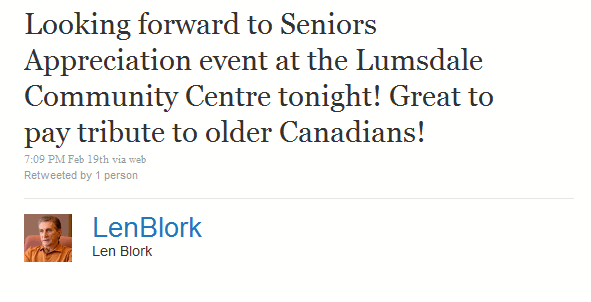 This is the hardest point for me to admit because, as a recovering politician myself, I’ve been guilty of this multiple times. It’s almost impossible to avoid: when you’re in a campaign, your life suddenly becomes A) more hectic and full than it’s ever been, and B) extremely lame to any sensible outside observer. Since most people use Twitter to comment on their day or share what they come across, it’s hard to blame candidates from publishing an endless string of “great meeting with a residents’ group this morning,” or “getting a positive response at the door” or “watch this video of me saying all the boring stuff I’ve been tweeting,” but NOBODY CARES EXCEPT YOU AND YOUR IRRATIONALLY SUPPORTIVE PARTNER. (And they’re probably just pretending.)
This is the hardest point for me to admit because, as a recovering politician myself, I’ve been guilty of this multiple times. It’s almost impossible to avoid: when you’re in a campaign, your life suddenly becomes A) more hectic and full than it’s ever been, and B) extremely lame to any sensible outside observer. Since most people use Twitter to comment on their day or share what they come across, it’s hard to blame candidates from publishing an endless string of “great meeting with a residents’ group this morning,” or “getting a positive response at the door” or “watch this video of me saying all the boring stuff I’ve been tweeting,” but NOBODY CARES EXCEPT YOU AND YOUR IRRATIONALLY SUPPORTIVE PARTNER. (And they’re probably just pretending.)
5. You’re just going to spam people with your party’s talking points.
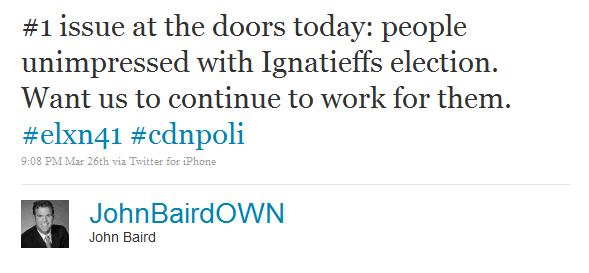 The major parties have already started sending out suggested talking points as tweets. They even come complete with hash tags like #elxn41, #lpc and #gpc so that you’re not just spamming your own followers, you’re also spamming all of the other people trying to follow those hash tags. You’re not adding any value, and everyone will just tune you out.
The major parties have already started sending out suggested talking points as tweets. They even come complete with hash tags like #elxn41, #lpc and #gpc so that you’re not just spamming your own followers, you’re also spamming all of the other people trying to follow those hash tags. You’re not adding any value, and everyone will just tune you out.
6. I don’t want to have to explain to you how hash tags work.
I just…don’t.
7. You might say something stupid.
This is my least favourite reason, and I don’t fully buy into it, but regardless of what I think it’s hard to imagine this list not containing this point. Frankly though, if you or your campaign team is worried you’ll say something on Twitter that could get you into trouble, you’re just as likely to say that same thing to a reporter or at a debate. The difference with saying it on Twitter is that it’s more likely to be reported as part of an eye-rolling “dangers of social media” narrative, or mischaracterized by political opponents or reporters who are Twitter-illiterate themselves. (I’m not saying all politicians or journalists are Twitter illiterate. I’m saying that with your luck, the journalist assigned to cover your tweet screw-up will be.)
8. You’ll mostly be tweeting to the choir.
Who do you think is really going to follow you? The average voter does their research by watching the news and visiting a few websites, they don’t want to be bombarded by your talking points and boring itinerary all day. The two groups of followers you’re most likely to pick up during an election campaign are the faithful and trolls. Even if you manage to pick up some real undecided voters as followers, how many do you think that will be? 50? 100? Is that going to decide the election?
9. It won’t help you get elected.
Go knock on doors. ID your voters. Make phone calls and send email before you compress your bumf into 140 characters. Get your name in the local paper and your voice on the radio. Unless you can clearly explain how your tweeting is going to lead to votes, why are you devoting so much of your limited time and energy towards it?
10. You’re going to stop after the election.
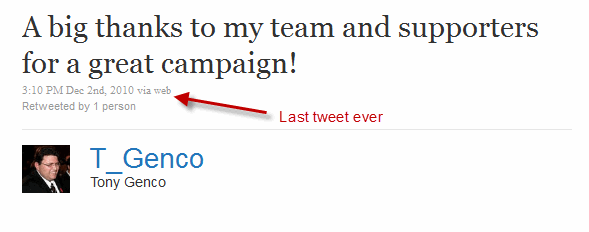 Twitter is a community (or, rather, a collection of communities). If you’re just crashing for your own selfish interests, it’s obvious to everyone else. Imagine if the election campaign was the first time you showed up at the local rate payers meeting or worship service or whatever, and then you never went again. (Wait, you’re not doing that too, are you?)
Twitter is a community (or, rather, a collection of communities). If you’re just crashing for your own selfish interests, it’s obvious to everyone else. Imagine if the election campaign was the first time you showed up at the local rate payers meeting or worship service or whatever, and then you never went again. (Wait, you’re not doing that too, are you?)
All that being said, if you can avoid all or most of these pitfalls then go for it! Done properly Twitter can be a great way to communicate with new people and keep up with breaking developments. I just don’t think it’s worth doing badly.
I wish I could give you some examples of great political tweeters to model yourself off of, but for my own sanity I follow very few. I think my local MP and MPP Bob Rae and Glen Murray do a pretty good job (Rae clearly writes his own tweets — his voice is unmistakable, and Murray engages with his constituents, especially those who disagree with him, perhaps more than any other elected official I’ve ever seen). I’m told that federal ministers Tony Clement and Jason Kenney were both pretty good before the election, but that now they’ve succumb to the above traps. Who am I missing?